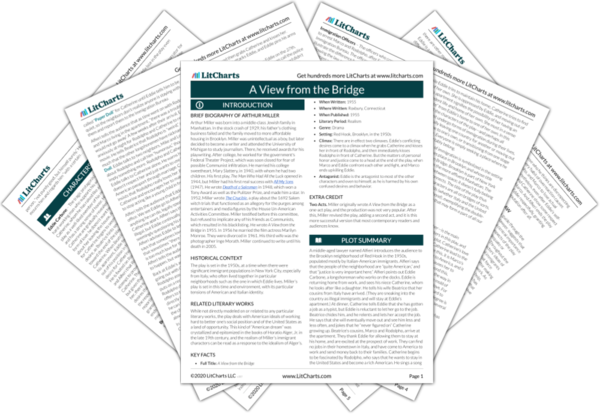If A View from the Bridge is the story of Eddie’s tragic decline, it is also the story of Catherine’s attempted ascent into maturity and adulthood. Over the course of the play, Catherine grows, matures, and attempts to carve out her own independent life, while Eddie struggles to keep her under his control—and his roof. Catherine gradually matures, as she finds a job and begins to assert herself with the help of Beatrice, who tells her not to act like a child anymore. Eddie misjudges Catherine’s maturity and continues to see her as a young girl; because of this, he denies her independence. But she is not the only one whose maturity he misjudges. He underestimates Rodolpho, repeatedly referring to him early in the play as “just a kid.” And, given his own childish jealousy and behavior, Eddie perhaps overestimates his own maturity, as well.
Eddie is sad to see Catherine grow up, and tries to hold onto her as she matures and becomes more independent. But even late in the play, it is questionable to what degree Catherine really achieves independence. For one thing, she still greatly cares what Eddie thinks, and tries to get him to come to her wedding. Moreover, she first begins to assert her independence mainly because Beatrice advises her to. Catherine thus ironically learns to think for herself by listening to someone else’s advice. And finally, in moving away from the control of Eddie, she at least partially comes under the control of Rodolpho, who calls her a little girl and whom she begs in tears to teach her. Given the play’s setting in the 1950s, in a traditional Italian immigrant community, it would be difficult for a woman to achieve absolute independence. Thus, even if Catherine still depends on others and her actions are partially dictated or influenced by others, this should not negate the fact of the immense growth and maturation in her character, as she gradually becomes more of her own person, and learns to assert herself against the controlling, oppressive figure of Eddie.
Maturity and Independence ThemeTracker

Maturity and Independence Quotes in A View from the Bridge
Katie, I promised your mother on her death-bed. I’m responsible for you. You’re a baby, you don’t understand these things.
Look, you gotta get used to it, she’s no baby no more.
I’m gonna buy a paper doll that I can call my own, A doll that other fellows cannot steal.
Beatrice:
The girl is gonna be eighteen years old, it’s time already.
Eddie:
B., he’s taking her for a ride!
Beatrice:
All right, that’s her ride. What’re you gonna stand over her till she’s forty?
It means you gotta be your own self more. You still think you’re a little girl, honey. but nobody else can make up your mind for you any more, you understand? You gotta give him to understand that he can’t give you orders no more.
Don’t, don’t laugh at me! I’ve been here all my life. . . . Every day I saw him when he left in the morning and when he came home at night. You think it’s so easy to turn around and say to a man he’s nothin’ to you no more?
Catherine. If I take in my hands a little bird. And she grows and wishes to fly. But I will not let her out of my hands because I love her so much, is that right for me to do?
This is my last word, Eddie, take it or not, that’s your business. Morally and legally you have no rights, you cannot stop it; she is a free agent.
The law is only a word for what has a right to happen. When the law is wrong it’s because it’s unnatural, but in this case it is natural and a river will drown you if you buck it now. Let her go. And bless her.
Catherine:
How can you listen to him? This rat!
Beatrice:
Don’t you call him that!
Catherine:
What’re you scared of? He’s a rat! He belongs in the sewer!
















